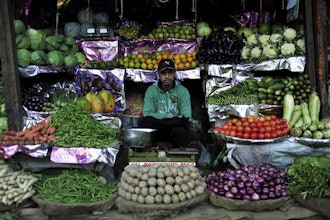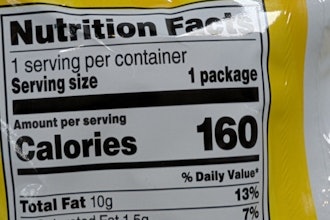
MEXICO CITY (AP) — After a decade of fighting for stronger food labeling standards in one of the most obese countries in the world, Mexican activists celebrated Monday over a new rule that will require warning labels on high-calorie products.
The new rules will require black octagonal stop signs to be printed on the front of packages reading “high in calories,” "excessive salt" or “high in saturated fat,” among other things.
In a country where 75.2% percent of people over 20 are either obese or overweight, current labeling rules require only a back-of-package listing of how much a product contains of daily recommended intake of key ingredients.
Consumer activist Alejandro Calvillo said current labeling rules were so unintelligible — each company lists “portion sizes” as it sees fit — that in one study, only 3% of university nutrition students could correctly interpret the labels. For example, some products use 30 grams as a standard comparison, some 100 grams.
The new label standards were approved by health authorities and announced over the weekend.
Special warning strips will be included for ingredients like caffeine and trans-fats, stating “not recommended for children.”
“This recognizes the right of consumers to have at least a minimal amount of information in the face of a health problem, a health catastrophe,” Calvillo said. "This is an issue where Mexico has to take the lead, because it has a very serious problem.
A recent study by the Organization for Economic Cooperation and Development shows Mexico stands to lose the greatest amount of life expectancy — an average of at least 4 years — due to obesity-related problems. In coming years, the country could lose over 5% of its GDP to obesity-related problems, including lost work hours and health costs.
Health authorities say about 39% of Mexicans are overweight and 36% obese. About 10% of Mexicans have some form of diabetes.
Authorities have not yet said when the new rules will go into effect, and Calvillo said food companies are expected to file court appeals against the new rules, as they have in the past.
Mexico's Consumer Products Industry Council, a trade group, did not immediately respond to requests for comment.
The new rules represent a rare victory for Mexico's civic and non-governmental groups, which have had a testy relationship with President Andrés Manuel López Obrador.
López Obrador has slammed anti-crime and anti-corruption groups as representing conservative opponents. But it may have helped the labeling cause that one of the president's first government jobs in the 1980s was in the consumer protection agency.
“The people in the Health Department, the Economy Department, the federal health standards agency have, for the first time ever, not been co-opted by economic interests,” said Calvillo. "For the first time there is a commitment to the public interest, rather than the interests of big corporations.






















